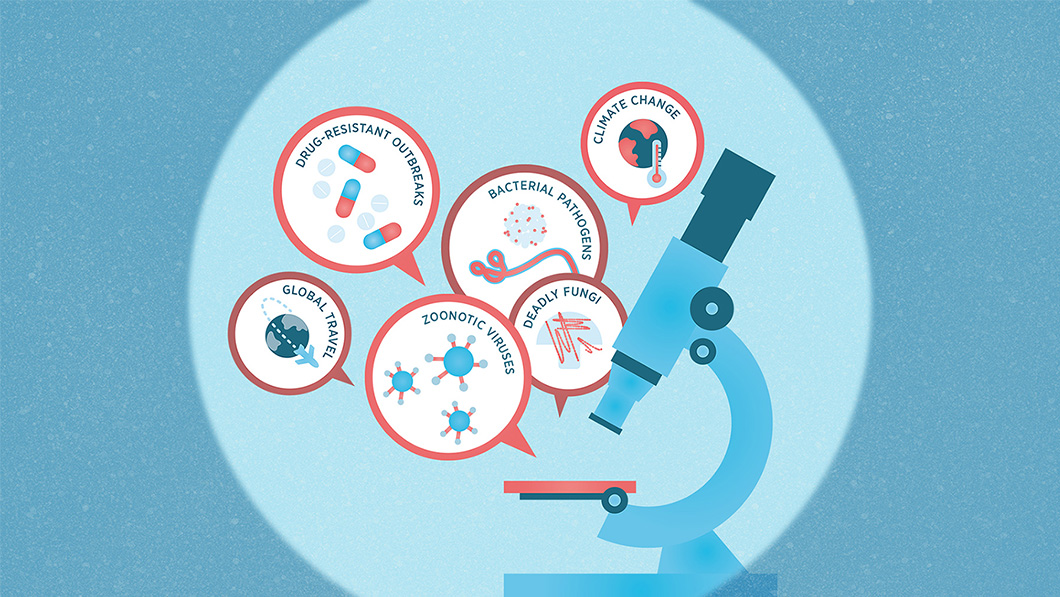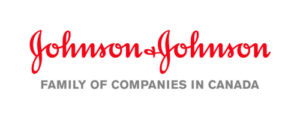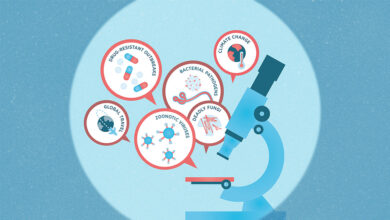
Measles on the move and a Pandemic Accord
Sponsored by:

PPF’s report The Next One: Preparing Canada for another health emergency outlines the lessons learned from the pandemic and how Canada can safeguard against future health emergencies. To keep the discussion going — and to keep Canadians informed — this newsletter looks at what’s happening in the world of health security each week. Here’s what we’re following:
Measles spread continues
More than a dozen measles cases have been confirmed across Canada, more than half of which have popped up in the Montreal area this year. Quebec health officials say they’ve confirmed 10 cases there, only three of which could be linked to travel outside Canada. Meanwhile, a teacher in his 30s with a confirmed case — and who hadn’t travelled and is fully vaccinated — prompted a pop-up vaccine drive at a high school in York Region where he’d had close contact with students and teachers.
While largely preventable with vaccines, measles can cause serious complications in children, even death. This latest Canadian outbreak is not without recent precedent; in 2014, there were 418 measles cases reported in five provinces and territories, the majority of which were reported, as now, in March – and of which only 25 were traced to travel. Most of those cases occurred in B.C., including a large outbreak within a religious community, where vaccine uptake was low. In March 2015 another outbreak led to 183 cases.
More measles cases are being reported in the U.S., too, with 41 cases now confirmed across 16 states. The largest number of confirmed cases has been in Florida, where the state’s surgeon general is being criticized for telling parents that unvaccinated children should still attend a Broward County school where multiple cases have been confirmed. Amid the backlash that followed, the Florida Department of Health issued a statement that blamed the media for “reporting false information” and “politicizing this outbreak.”
Listen to WONK: Former Chief Justice of the Supreme Court Beverley McLachlin on the Online Harms Act
Pandemic Accord nears final stage
The World Health Organization last week circulated the draft negotiating text of the Pandemic Accord, an international agreement spawned in the wake of the pandemic to “ensure communities, governments, and all sectors of society…are better prepared and protected, in order to prevent and respond to future pandemics.”
At the heart of the agreement, the WHO stated last summer, “is the need to ensure equity in both access to the tools needed to prevent pandemics…and access to health care for all people.”
That commitment is now subject to dispute. One of the main sticking points in negotiations has been pathogen access and benefit-sharing, or PABS, which is how countries share information about pathogens with pandemic potential, and in particular, how nations are rewarded for doing so. On one side are the U.S. and EU, which are against a WHO-run bureaucracy that they say would slow vaccine and medicine production. On the other side, many African nations argue they should be compensated for providing information that would lead to the development of a vaccine.
More broadly, the accord has been criticized as being too watered-down, with few strong commitments and deliberately avoiding “difficult topics,” as one Dutch stakeholder put it in September.
The Lancet agrees. Contrary to the WHO’s stated goals, the draft document “stipulates that WHO would have access to only 20 percent of ‘pandemic-related products for distribution based on public health risks and needs.’ The other 80 percent — whether vaccines, treatments, or diagnostics — would be prey to the international scramble seen in COVID-19 that saw vital health technologies sold to the highest bidder,” the publication said last week. “Creating and signing up to a strong and truly equitable set of terms on access and benefit sharing is not an act of kindness or charity. It is an act of science, an act of security, and an act of self-interest.”
Are hackers coming for health care?
A Bitcoin blockchain transaction may indicate that Change Healthcare has paid a Russian hacker group known as AlphV or BlackCat a roughly $22-million ransom in the wake of a large-scale cyberattack that has crippled its systems for two weeks. Two days after the transaction occurred, someone claiming to be an affiliate of the hacker group complained in an underground forum that AlphV had cheated them out of their share of the ransom. Wired magazine asked Change Healthcare whether it had indeed paid a ransom, but the company declined to address the question, saying it is “focused on the investigation right now.”
The same anonymous poster also claimed that, in accessing Change Healthcare’s systems, they were also able to access data of other health-care firms affiliated with it, suggesting even further risk.
If Change Healthcare did pay a ransom, it could set a dangerous precedent, one expert told Wired. “It highlights the profitability of attacks on the health-care sector,” Brett Callow, a ransomware-focused researcher with security firm Emsisoft, told the magazine. “Ransomware gangs are nothing if not predictable: If they find a particular sector to be lucrative, they’ll attack it over and over again, rinse and repeat.”
UPCOMING: Annual Testimonial Dinner Honour Roll 2024
Join more than 1,200 leaders and policy wonks as PPF pays tribute to Canadians who have made outstanding contributions to public policy and good governance. This year’s dinner takes place on April 11 at the Metro Toronto Convention Centre — in the biggest dining room you’ve ever seen! Be in the room where it happens.
Syphilis in the U.S.
The U.S. experienced a 79 percent increase in syphilis cases nationwide between 2016 and 2022, with maternal syphilis rates jumping by 222 percent over the same period, according to CDC data released last month. The overall rate of syphilis in mothers giving birth during that period tripled, rising from 87.2 to 280.4 per 100,000 births. The problem is particularly acute in South Dakota, Montana, Colorado, New Mexico, Alaska and Mississippi. Now, to make matters worse, there’s a national shortage of Bicillin, a common antibiotic treatment, which is now driving up infection rates.
Part of the reason for the shortage is consolidation. “Twenty years ago, there were at least three manufacturers of the syphilis shot. Then Pfizer, one of the manufacturers, purchased the other two companies and became the lone U.S. supplier,” ProPublica noted in a lengthy examination of the syphilis spread published last week. “Even during times when Pfizer had not notified the FDA of an official shortage, clinics across the country told ProPublica, the shots were often hard to get.” ProPublica outlined steps the government could take to help, including forcing Pfizer to be more transparent, manufacture the drugs itself, reserve its current stockpile for infected individuals, and/or drive down costs.
Canadian Covid Society launches
The Canadian Covid Society launched this past week. It’s a new non-profit that will support those with COVID-19, work to protect people from the disease, and raise public awareness. “We have foundations for heart disease. We have foundations for cancer, but we need a group dedicated to fighting COVID-19,” said Toronto-based emergency physician, Dr. Kashif Pirzada, one of the co-founders of the society.
The group notes that COVID continues to cause significant chronic illness and remains the third leading cause of death in Canada, after cancer and heart disease. “It still continues to be a stressor on our health system up to this present day. It is contributing to poor health and excess deaths,” said Pirzada.
Meanwhile in both the U.S. and the U.K. there have been calls to create COVID-19 memorials. In London, volunteers who help maintain a memorial wall are urging the government to step up and make the monument permanent. In the U.S., Senators Elizabeth Warren and Ed Markey asked Congress to pass a resolution naming the first Monday of March as “COVID-19 Victims Memorial Day.”
Events
March
- March 14-15: WHO International Working Group for Drug Statistics Methodology.
- March 14-17: Annual World Conference of SBMT. Los Angeles, CA
- March 18-20: Bio-Europe Spring. Barcelona, Spain
- March 19-24: Advanced Therapies Summit. London, U.K.
- March 19-21: Rare Diseases Summit. Philadelphia, PA
- March 25-27: Ketamine and Related Compounds International Conference 2024. Oxford, U.K.
- March 26-28: Precision Med TRI-CON. San Diego, CA
April
- April 1-4: World Vaccine Congress. Washington. D.C
- April 15-17: Festival of Biologics. San Diego, CA.
- April 15-17: Bio-IT World Conference & Expo. Boston, MA
- April 17-18: CMO Summit 360. Boston, MA
Did someone forward you this newsletter? Subscribe to PPF: Health Security newsletter
This newsletter is produced by journalists at PPF Media. It maintains complete editorial independence.



